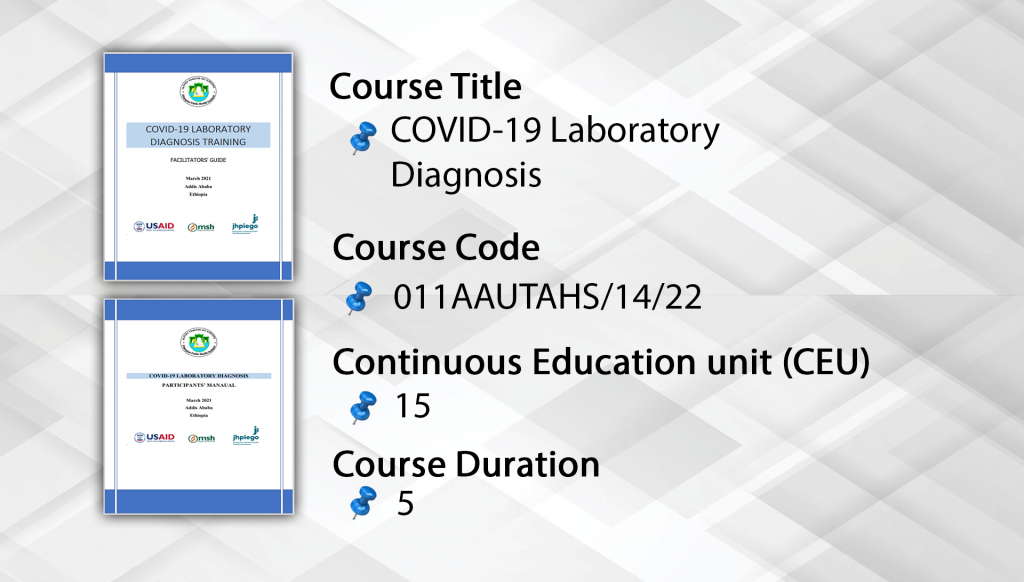2. COVID-19 Laboratory Diagnosis

Course Description
This five-day training course is prepared for laboratory professional involved in COVID-19 lab diagnosis. It enables them to conduct standard safety practice, sample management, testing and result interpretation.
Goal
To provide the participant with knowledge, skill and attitude needed for COVID-19 laboratory diagnosis.
Participant Learning Objectives: By the end of this training course the participant will be able to:
- Describe COVID-19 disease;
- Demonstrate COVID-19 biosafety and biosecurity standards during COVID-19 diagnosis;
- DemonstrateCOVID-19 specimen management;
- Describe different principles and application of RT-PCR and Ag RDT for SARS-cov-2 detection;
- Demonstrate principles and application of RT-PCR and Ag RDT for SARS-cov-2 detection;
- Describe Quality assurance in RT-PCR for SARS-CoV-2
Training /Learning Methods
- Guided Practice
- Demonstration
- Illustrated Lecture
- Role Play
- Case scenario
- Laboratory attachment
- Group discussion
Training Materials
- COVID-19 Laboratory Diagnosis package ( PPT, Participant manual and facilitator Guide)
- LCD projectors, flip charts, markers, laptop computers
- PPE materials, facility
- Laboratory Reagents
- Laboratory used material and equipment in RT-PC(RT-PCR machine, Heat block/incubator, Micro-centrifuge, etc)
References
- WHO
- IATA
- CDC
- MOH
- ISO15189 &15190
- Published researches
- Other well-known e-learning source
Participant Selection Criteria
Participant for this course should be laboratory professional who are responsible for performing RT-PCR COVID-19 lab diagnosis.
- Having a minimum of BSc degree and having working experience in laboratory practice.
Method of Evaluation
- Participant
- Formative
- Pre test
- Group exercise
- Demonstration
- Summative
- Knowledge assessment (50%): post course questioners
- Evaluation of participant practical session (45%)
- Participant attendance (5%)
- Course Evaluation
- Daily evaluation
- Daily trainer’s feedback meeting
- End of course evaluation
Certification Criteria
- Participants will be certified when they score more than 70% or 85% in summative assessment (Basic training: 70%, TOT:85%)
Trainer selection criteria
- Facilitation training skill course and
- Trained and experienced on COVID-19 RT-PCR lab diagnosis or
- Involved in COVID-19 RT-PCR lab diagnosis module preparation
Course Venue
- In-service training center with functional internet service
Course Duration
- Five Days
Course composition
- Sixteen(16) participants
- Four(4) trainer
